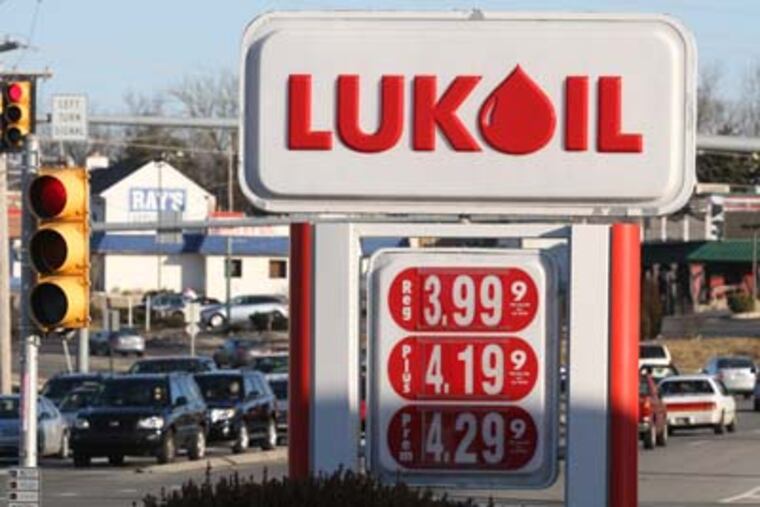Idled refineries contribute to rising gasoline prices
Susan Bethard stopped at a Sunoco station in Lower Chichester Township Monday to put 9.3 gallons of gasoline into her Pontiac before departing on a mission to the shopping mall. The price per gallon: $3.65.

Susan Bethard stopped at a Sunoco station in Lower Chichester Township Monday to put 9.3 gallons of gasoline into her Pontiac before departing on a mission to the shopping mall. The price per gallon: $3.65.
"I try not to look at the prices, they're shocking," said the Trainer resident. Between driving her daughter to cheerleader competitions and commuting to her job as a sales assistant at a Bala Cynwyd investment firm, the fuel charges are taking their toll.
AAA says the average price nationwide was $3.56 on Sunday, up five cents in a week, and the pain is expected to get worse in the next few months.
"Prices for regular grade gasoline could push $4.00 per gallon by the end of April or early May," according to the auto club.
Analysts blame rising crude oil prices, sparked by speculation and fear over instability in Iran, for the run-up in fuel prices. Gasoline has increased about 10 percent this year.
A contributing factor may be the idled state of the Sunoco Inc. refinery in Marcus Hook, just a few hundred yards from the service station where Bethard filled up on Monday.
Sunoco, saying Marcus Hook was bleeding cash, shut down the plant in December, not long after the nearby ConocoPhillips in Trainer called it quits. Together, the two refineries produced about 20 percent of the gasoline consumed in the Northeast. Their owners are attempting to sell the plants, without success.
"As soon as these two refineries shut down, prices started rising," said Denis Stephano, president of United Steelworkers Union Local 10-234, which represents workers at the idled ConocoPhillips refinery.
"When you shut refineries down, you take refined product out of the market," he said.
The fuel price increases follow a typical annual pattern, though it is happening earlier than in previous years. The Associated Press reported Saturday that gasoline prices have never been higher this time of the year, prompting media outlets to mobilize forces of commentators.
"I think this is very similar to past years, though the price increase has started earlier and is complicated by refinery shutdowns on the east coast," said Tom Kloza, publisher and chief oil analyst for the Oil Price Information Service.
Price volatility could get worse in June if Sunoco is unable to find a buyer for its Philadelphia refinery, which processes 335,000 barrels a day, nearly as much as the two refineries in Marcus Hook and Trainer. Sunoco says it will shut the Philadelphia plant down if a buyer can't be found.
On the upside, however, the increasing price for refined products - gasoline, diesel, heating oil and jet fuel - might make the refineries more attractive to buyers.
The Energy Information Administration in December predicted the closure of the refineries could increase price volatility as markets adjust to new supply routes. Most of the fuel now consumed in the Northeast is delivered from the Gulf Coast by pipeline or by ship from overseas refineries.
As fuel consumption declines in the United States from its 2007 peak because of increased efficiency and the economic downturn, refineries in the Caribbean and Europe are shutting down in response to "demand destruction."
For brothers Anthony and David D'Angelo, demand destruction is very local. For 42 years, Tony has owned the Linwood Sunoco service station on Ridge Road where Bethard filled up on Monday. The gas station is so close to the Marcus Hook refinery that some customers mistakenly think it's connected by direct pipeline to the plant, said Dave, who manages the station.
Over the decades the D'Angelos have experienced numerous cycles of gasoline-price spikes, and the scenario usually plays out the same: Prices get high enough that motorists take notice and curtail consumption, causing supplies of fuel to build up and prices to decline. It's a classic supply-and-demand curve.
But something about the current cycle seems different, at least on a local scale.
Since the two refineries shut down, demand has fallen significantly at Marcus Hook businesses for everything from hoagies to haircuts. As refinery workers and contractors have disappeared - 102 Sunoco workers were laid off last week - demand for fuel and vehicle repairs at the Linwood Station has also declined.
"It's just a domino effect," said Dave D'Angelo.